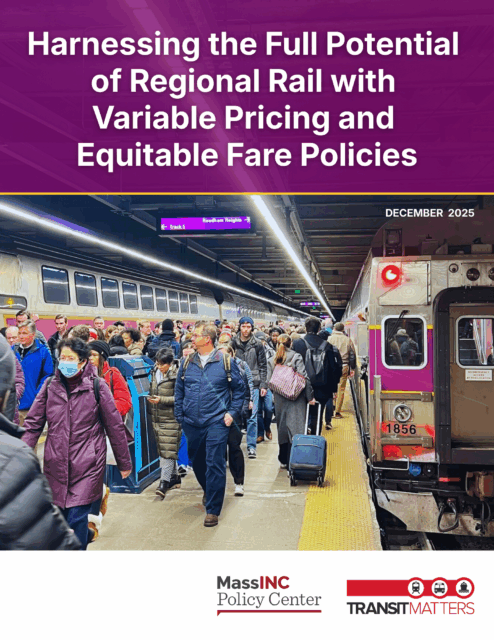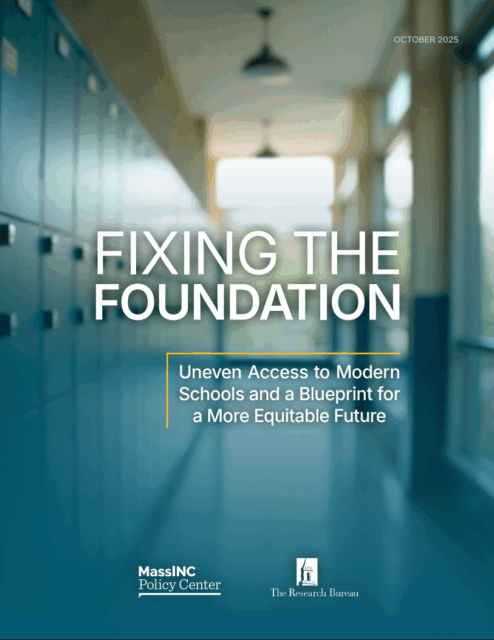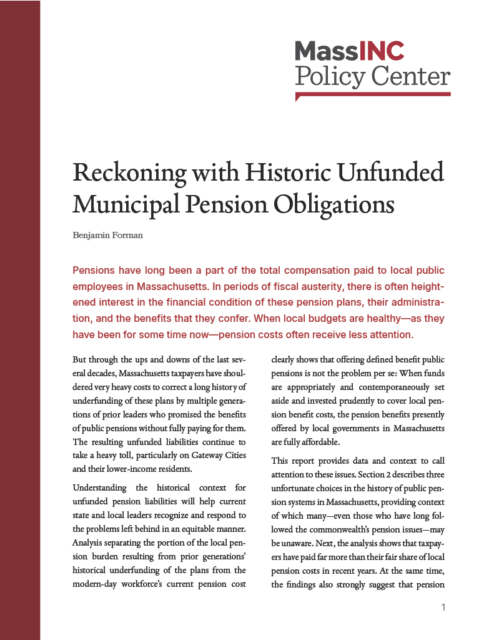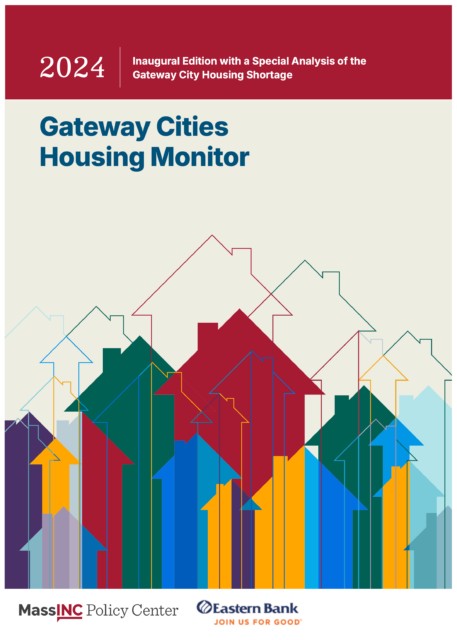Research
Browse research releases from the MassINC Policy Center.
Explore Topics
-
The Massachusetts Middle Class Status Report
As MassINC marks its 30th anniversary, the Massachusetts Middle Class Status Report revisits a foundational question: whether households in Massachusetts can achieve economic security, stability, and full participation in civic life. Using a multidimensional economic capacity framework, the report offers a rigorous, data-driven assessment of whether the Commonwealth’s economy is delivering broadly shared prosperity.
January 28, 2026
-
Case Study: Teach Western Mass
Vital lessons for systems change initiatives seeking to solve education equity challenges.
December 12, 2025
- Teach Western Mass (TWM) built culturally responsive training and recruitment programs that expanded access to teaching and increased educator diversity in Holyoke and Springfield.
- In partnership with school districts, colleges and universities, and the state education agency, Teach Western Mass helped elevate educator workforce and diversity as a shared regional priority.
- TWM’s early ambitions to change systems to expand the regional educator pipeline delivered impact, but limited capacity ultimately required the organization to focus on its teacher residency training program.
- This case study underscores the challenges that small nonprofits face mounting long-term system-change efforts.
-
Harnessing the Full Potential of Regional Rail with Variable Pricing and Equitable Fare Policies
This analysis outlines a practical path to increasing ridership and expanding access on the commuter rail through variable pricing and more equitable fare structures. The report shows how Massachusetts can make measurable progress toward Regional Rail by leveraging existing system capacity to strengthen economic mobility across the Commonwealth.
December 9, 2025
-
Fixing the Foundation: Uneven Access to Modern Schools and a Blueprint for a More Equitable Future
This report examines disparities in school facility conditions across Massachusetts and their implications for student learning.
October 7, 2025
- Nearly 60% of Massachusetts’ lowest-rated or over-capacity schools are located in Boston or a Gateway City.
- At the current pace, it could take 50 years to replace or renovate all high-need school buildings in Massachusetts.
- Suburban districts received 57% of major MSBA Core Program grants since 2015, while Boston and Gateway Cities received less than 19%.
-
2025 Gateway Cities Housing Monitor
The MassINC Policy Center’s annual deep dive into the housing trends shaping opportunity and growth across Massachusetts.
September 17, 2025
-
Constructing the Future: Strategies to Help Massachusetts Meet Its Clean Energy and Housing Goals
June 17, 2025
- Construction output has declined in recent years. Prompt action to stimulate demand is necessary to sustain this critical workforce and preserve long-term industry capacity.
- Assuming continued economic growth, scaling up the training system to meet workforce needs for housing and clean energy should be an attainable goal.
- Recent progress in racial, ethnic, and gender diversity presents an opportunity to expand the industry’s future labor pool.
- Reducing construction costs while maintaining competitive, family-sustaining wages will require meaningful gains in productivity.
-
Reckoning with Historic Unfunded Municipal Pension Obligations
This report examines the historical decisions that contributed to these unfunded liabilities and highlights how current taxpayers are paying more than their fair share.
March 25, 2025
- As of 2023, recent generations of Massachusetts taxpayers paid an estimated $22 billion more than their fair share to cover local pension obligations left by prior generations, yet these local plans still have an estimated $8 billion in unfunded liabilities.
- Current taxpayers face additional costs because most of the pension funds are managed by local boards that have underperformed the state pension fund by more than $5.4 billion since the 1980s.
- Geographic disparities associated with uneven changes in population since the late 1970s have exacerbated this burden for residents of some communities, including many Gateway Cities.
- This pattern means lower-income residents and people of color shoulder an inequitable share of legacy pension costs. Since the 1980s, Gateway City residents have paid billions more than their own generation’s fair share to cover local pension costs, with more than $5 billion in appropriations made for legacy pension costs since 2010.
-
Early College Life Sciences Pathways
Expanding Early College access and strengthening career-connected learning are critical to ensuring Massachusetts maintains a competitive, skilled workforce. This report outlines four key objectives to guide an expansion strategy that state leaders are currently developing.
March 3, 2025
- Early college is Massachusetts’ most systemic and impactful effort to increase college access and success. Marrying this educational equity strategy with industry-led efforts to grow the life sciences workforce will deliver stronger results on both fronts.
- Building robust Early College life sciences pathways is a difficult and complex undertaking that requires strong industry involvement. At present, the industry has very little awareness of the state’s Early College strategy, and there has been no formal effort to engage the sector in the state’s ambitious Early College initiative.
- With the Massachusetts Early College Initiative conducting its first strategic plan and the state’s Life Sciences 3.0 economic development package signed into law, the coming months will be decisive. The actions leaders take to enable the growth of Early College life sciences pathways will heavily influence the ability of Massachusetts students to participate fully in this cutting-edge industry for years to come.
-
Opening the Doors to the Jobs of the Future
Expanding Early College access and strengthening career-connected learning are critical to ensuring Massachusetts maintains a competitive, skilled workforce, and this report outlines four key objectives to guide the state's expansion strategy.
March 3, 2025
- Massachusetts must significantly expand Early College programs to reach more low-income students, as current enrollment remains too limited to make a substantial impact. The state should prioritize high-potential high schools and utilize hybrid or online learning models to ensure accessibility, particularly for students in rural areas.
- Current Early College programs lack structured connections to high-demand industries like health and STEM. A more robust program should integrate specialized advising, career development experiences, and credit accumulation targets, while also aligning Early College with Innovation and Career Pathway (ICP) programs.
- Expanding Early College to middle-income students can create more diverse learning environments, strengthen urban schools, and support high school redesign in smaller districts. Targeted strategies include regional partnerships, urban magnet schools, and enrollment goals that promote integration in Boston and the Gateway Cities.
- Sustainable Early College expansion will require clear governance structures, accountability measures, and administrative capacity. Some necessary policy changes will need to be addressed through board decisions, legislation, and budget appropriations.
-
2024 Gateway Cities Housing Monitor
To recover from an affordable housing crisis that has been decades in the making, Massachusetts needs Gateway City housing markets to produce new homes in line with increasing demand.
November 14, 2024
- Over the next ten years, Gateway Cities should aim for the creation of 83,000 additional housing units.
- Meeting the housing production goal requires doubling the pace of housing production compared to the previous 10 years.
- Increasing housing production will require robust state and local partnerships to overcome financial and regulatory barriers.









